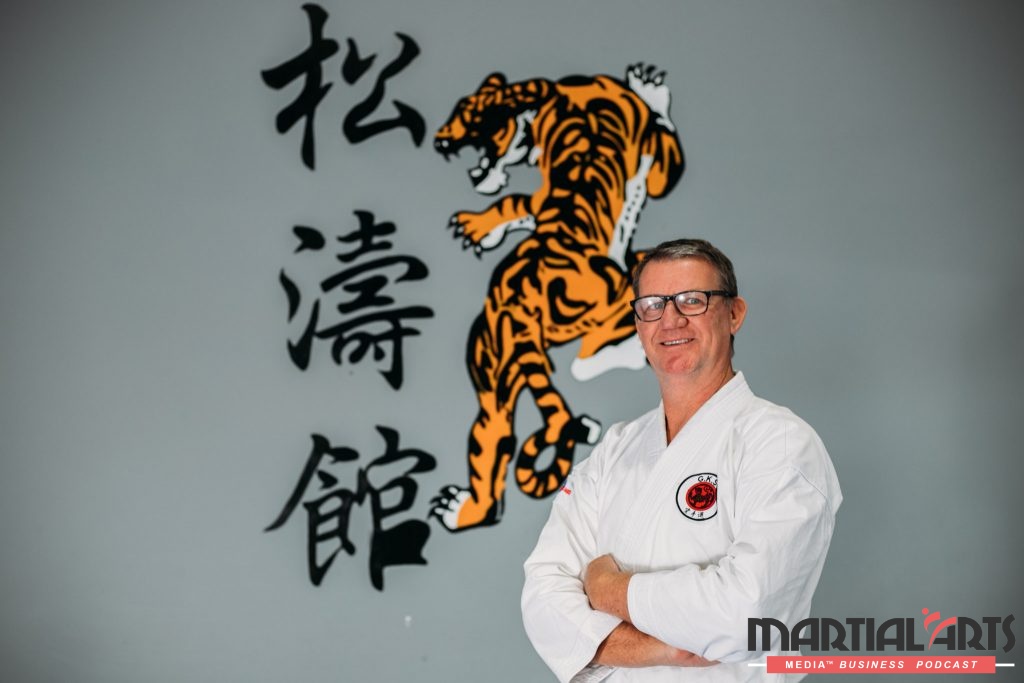Richard Fall shares how they generated $30,000+ in 72 hours for his karate school with The 72 Hour ‘Cash Boost’ Sale.
IN THIS EPISODE:
- How Richard and Kim generated $30,000 in just 72 hours
- How asking for help leads to faster martial arts business growth
- Why action takers are the money makers
- The power of surrounding yourself with like-minded people
- How to get over the fear of charging what you're worth
- And more
*Need help growing your martial arts school? Learn More Here.
TRANSCRIPTION
GEORGE: Hey, it's George Fourie. Welcome to the Martial Arts Media™ business podcast. Today, I have two special guests with me, and in fact, this is my favorite type of episode to create. Look, we have great interviews on our show, but these ones are a bit more special for me, because this is a case study interview. And so, a case study interview is me interviewing some of our top clients and documenting the journey that they've gone through working with us, and celebrating the great result that they have achieved.
And so today, I have Richard Fall, and Kim Comeau, from London Karate Club in Ontario, Canada. And we actually met via this podcast – I was chatting to Kim on Instagram, she was, “Hey, we actually listen to you every day!” And we got chatting, and we started working together, and it's been really such a great pleasure working with Richard and Kim, and seeing what great results they have achieved. And we're going to chat about that, because just recently, Richard and Kim went through a process that we call the '72 Hour Cash Boost Sale', which is exactly what it is. And they managed to generate $30,000 in just 72 hours.
Now, that's the highlight, right? And hey, we got to talk about the highlights first. But it wasn't that easy to get to that point! Yep. The cash was collected in just 72 hours, but there was a lot that had to happen. Mindset, just belief in the process, belief that it can happen, and just being comfortable in creating a promotion like that without feeling like they're being sellout or cheap, or, you know, just being weird about how they operate their martial arts school.
So, we're going to jump into the details, just how they worked through it, what they went through, the change of mindset, and really how any school owner could achieve results like that on a continuous basis, if they committed to the process. So, we'll jump into the details, and just for a bit of context, the strategy, it's something that we do in our Partners program.
Our Partners program is our flagship program that you've heard me speak about before if you've listened to us before. It's a group of school owners that we work with around the globe, we get together weekly and, you know, work through different strategies on how to attract the right students, increase signups, and retain more members. And so, the 72 Hour Cash Boost Sale is a process that you can run about four times per year, and it's just a great way to boost your cash flow.
We'll dive into the details and I'll tell you how. So, jump right in. If you – depending on where you're listening or watching this episode, you can get the show notes on martialartsmedia.com/127. That's the numbers one-two-seven.
And you can also download our eBook, ‘The Ultimate Facebook™ Ad Formula for Martial Art Schools'. And that's it, jump into the episode, I'm sure you're gonna enjoy it. And wherever you're listening or watching make sure that you subscribe, that you get notified when we have a new episode. Enjoy.
So, Richard and Kim, what's been the most profitable and most successful marketing campaign and ad campaign that you've done recently, or up to date?
RICHARD: Most important one that I've done and the most profitable one I've done was the 72 Hour Sale that you set out for us. Like, I've had goals in the past that I've made, but I've never surpassed what you had mapped out for us in the 72 Hour Sale. I think moving forward, the most important, yeah, that was the most important one that stood out in my whole running of the dojo career.
GEORGE: That's awesome. And what was the outcome? What was the result?
RICHARD: The outcome was around almost $31,000, which is what we did. Like, we had a goal to sell 20 memberships, and we were okay at only selling 12. Twelve was our minimum, 20 was our goal; and we did 20, right on the nose. So, we did 20 memberships right on the nose.
GEORGE: That is pretty cool, right? 31,000 in between the COVID madness and things like that. How did that impact the business?
RICHARD: The impact on the business? We… It was to the point where COVID was kind of taking away from my business what I had made up to that point and it actually fueled the dojo to be, or the school to actually be able to carry forward into this year. So, I had no worries carrying forward into this year.
So, it actually helped me out quite a bit, with just the money part of it. Just the money part and the worries of being able to pay the bills, being able to pay employees, and, you know, taking care of business itself. So, it took a lot off my shoulders stress-wise that way, and really gave me a good kickstart for 2022.
GEORGE: Love it. Alright, so, before we get into all the other good stuff, welcome to the show and thanks for jumping on! So, a bit of context. I've been working with Richard and Kim for, I don't know, maybe about almost a year, maybe?
RICHARD: Almost a year, yeah.
GEORGE: Before we jump into everything else, firstly, you're sitting behind an awesome wall. But I've got Richard Fall and Kim Comeau from London Karate Club in Ontario, Canada. Just give us a bit of a round up. What do you do? What do you teach? And yeah, just a bit of a background; a quick, brief background about the business.
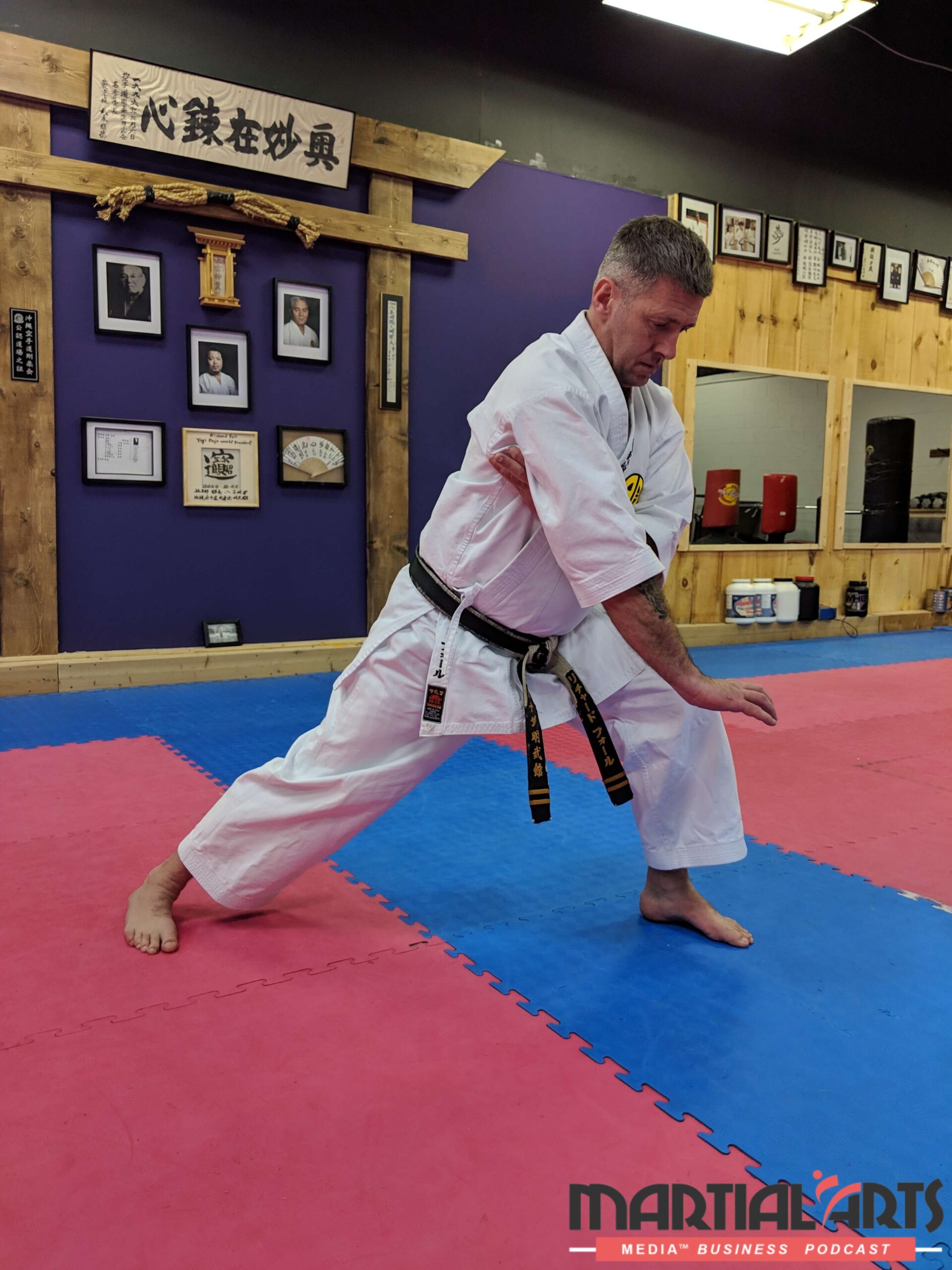
RICHARD: I'm the owner of the London Karate Club and my teacher is Master Meitatsu Yagi out of Okinawa, Japan, and I've been training with him since 1985. And I've been training myself in karate for about 42 years. And yeah, so, we teach Meibukan Goju-Ryu, and we just teach karate, we don't teach anything else but karate.
And, you know, we leave all the other stuff, jiu jitsu and that stuff, to the professionals that handle that stuff, and that's what we do. I follow the family religiously, and I travel to Okinawa when I can. Just over the last few years, I couldn't travel and see my teacher, but it's – we're moving forward. We're moving forward towards seeing each other again.
GEORGE: Awesome. And the important right-hand lady sitting next to you… Kim!
KIM: Yeah, so, I've been training for about 20 years now, and I joined the London Karate Club about six years ago. So, I've been training under Sensei Richard Fall for six years. And I've also traveled to Okinawa and have credentials internationally, or black belt gradings and stuff. I came on board to help with the backend of the business. So, a lot of the advertising and Facebook and social media stuff.
RICHARD: She was also the first Canadian woman to win a tournament in Okinawa.
GEORGE: Wow… and you just left that out, right?!
KIM: And that…
GEORGE: Of course, yeah. Any other credentials that are hidden from us, Richard, that we need to, we need to bring to light?
RICHARD: Ranks don't really matter, but I'm a 9th Degree Black Belt. Hanshi under Dyson, say, Meitatsu Yagi in Okinawa, which makes me the highest rank in my style in Canada. So…
GEORGE: Amazing.
RICHARD: Allows me to do international gradings myself, and on behalf of my teacher, and we're hopefully going to soon connect Zoom classes with them, so that we can reach out to the entire world, right, with him and try to see if we can get some movement for him, you know, as well.
GEORGE: That's cool. So, now I know you're very passionate about your karate and you're a purist at heart and can see it in the display behind you there. Do you want to just give us a quick round up – what are we looking at in the background there?
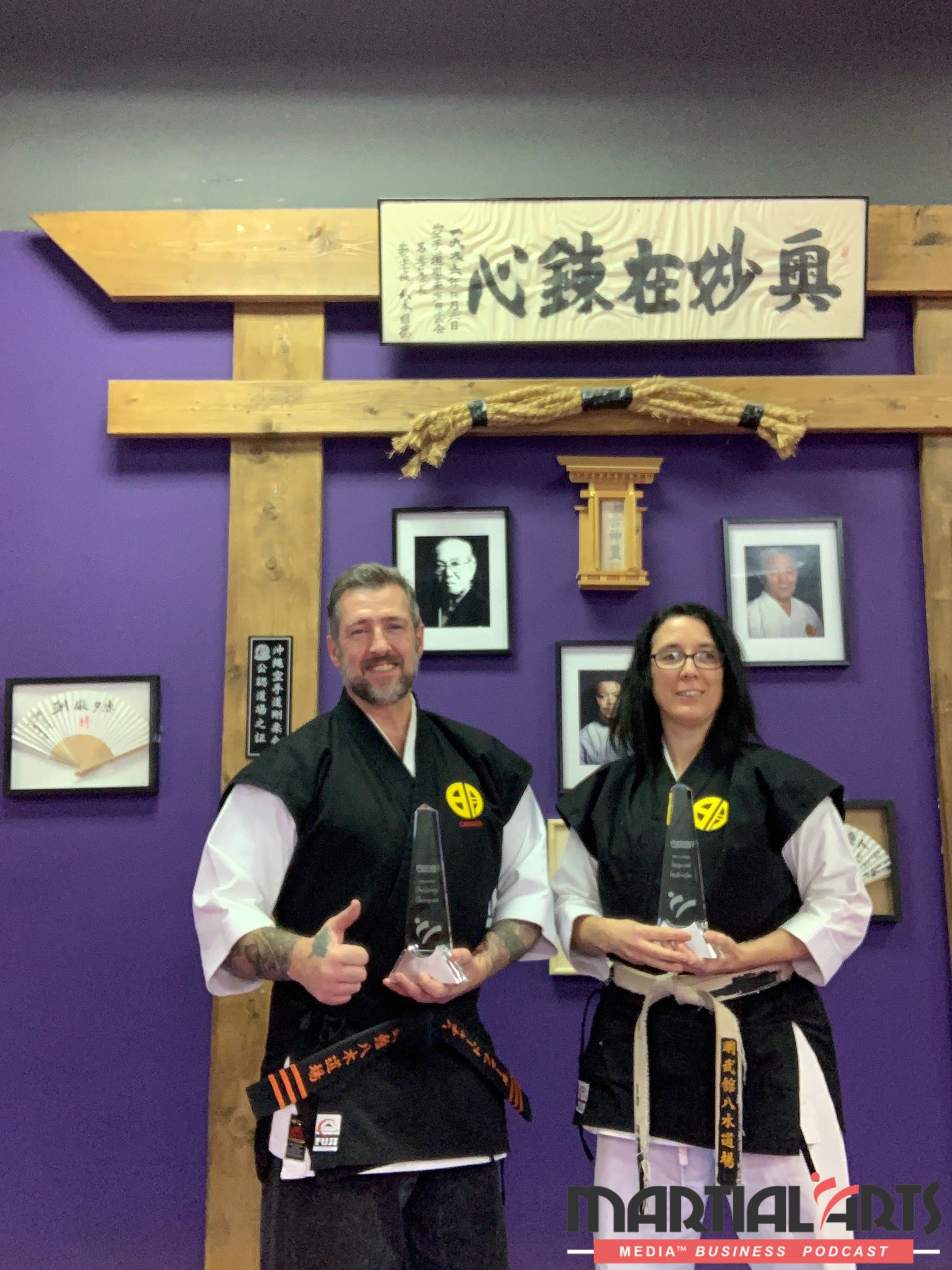
RICHARD: So, the three people behind me, the black and white picture above my head is Master Meitoku Yagi, the founder of Meibukan Goju-Ryu, who I have a third degree under, and fortunate to meet in 1990. To over Sensei Kim's head is my master, Master Dai Sensei Meitatsu Yagi, and then the guy that's just below is Ippei Sensie, his son. The kanji behind me means great well, so it means to move forward and the opportunity to make great wealth.
GEORGE: And what else have we got?
RICHARD: Well, we got, we have the rope above my head, on the shrine there, that's from the tug of war in Okinawa. 2013, I went over and we did the festival of rope. The festival of rope is the longest tug of war in the world. They do it every October, it's kind of like an Oktoberfest, but it's to usher in good crops. They used to be to usher in good crops, and then what all would do, all the territories around the area would come together, and they would do kata in the Kokusai-dori, which is the main strip in Okinawa, and I had the fortune to be able to demonstrate my karate in with the Okinawans as well.
GEORGE: That's cool. So, you treasure that, and the history and the heritage, how do you bring that into the school and into the teaching?
RICHARD: When our students move forward, they have to actually learn history. So, as they move forward, they have to know who the master of the style is, who the creator of the style is, and what our history is. So, we go all the way from Chojun Miyagi to Meitoku Yagi. So, the founder of Goju-Ryu, Goju-Ryu is one of the major styles that make up all of karate in the world. So, Chojun Miyagi passed on, his family passed on the style to Meitoku Yagi Dai Sensei, and then passed the style onto his son. So, our lineage is a pure straight line.
So, right straight from Chojun Miyagi, all the way to me is a straight line, there's no fragments in between at all. So, the culture is carried forward, because bringing my teacher here, he's very big on history. And I know history has a part of understanding where you come from, but it's not the end-all be-all, right? So, you can't, with me being part of, understanding history, I've always found that I'm humble.
So, being too humble sometimes can shoot you in the foot, because you don't feel like you should charge as much for what you're doing. Because it's more spiritual to you, right? It's more inside that you feel gratification, through teaching, right? So, as I was growing up, going through, growing up as a child, I wasn't a very good teenager. I was actually getting into a lot of trouble and causing problems. And then that's when I first got introduced at around 15 and a half to karate, and karate actually saved my life. Two people that I hung around with actually committed murder and it could have easily been me.
So, I owe karate my life. So, I kind of took that for… I've been in business for probably about 32 years now, and never really made a huge success. I'm still doing a part-time school, and still working a job during the day. I know, George, that makes you cringe. But I'm trying to get past that guy who is still afraid to step out of what he does as a job and get into something that he does for a passion.
GEORGE: Alright, so, you mentioned and I want to get back to Kim on just what part of that attracted you to training under Sensei Richard Fall. So, but on that, because you bring up a point, and this is a point that comes up a lot. I think the connection between the spiritual aspect and what martial arts mean to you personally, and then there's the business side, that's what's got to happen.
Somehow, in most humans' brains, we make this connection, or there's past programming, that money is evil, or money's bad. Or there's somebody that's a real, you know, I don't even like the term dojo, but there's, you know, people that are just teaching real watered down, poor martial arts, and they're charging an arm and a leg and they're ripping people off. We didn't, I don't really see much of that in Australia, but you know, if you watch McDojoLife, you'll probably see, you can probably see it all, right? But I think there's a lot of danger there, right? Because you don't want to be that guy, and so now you link old programming to you know, money, how money is bad.
And if I'm going to make money with my spiritual thing, that means so much to me and has impacted my life in such a positive way, and now I start focusing on the money, I'm going to be perceived as that guy… and I think that's a big thing that a lot of martial artists get stuck with. How do you feel you've overcome that? Because I think you, you might not be giving yourself as much credit is due, right, because you've moved a few mountains. How's your perspective changed over the last six months or so?
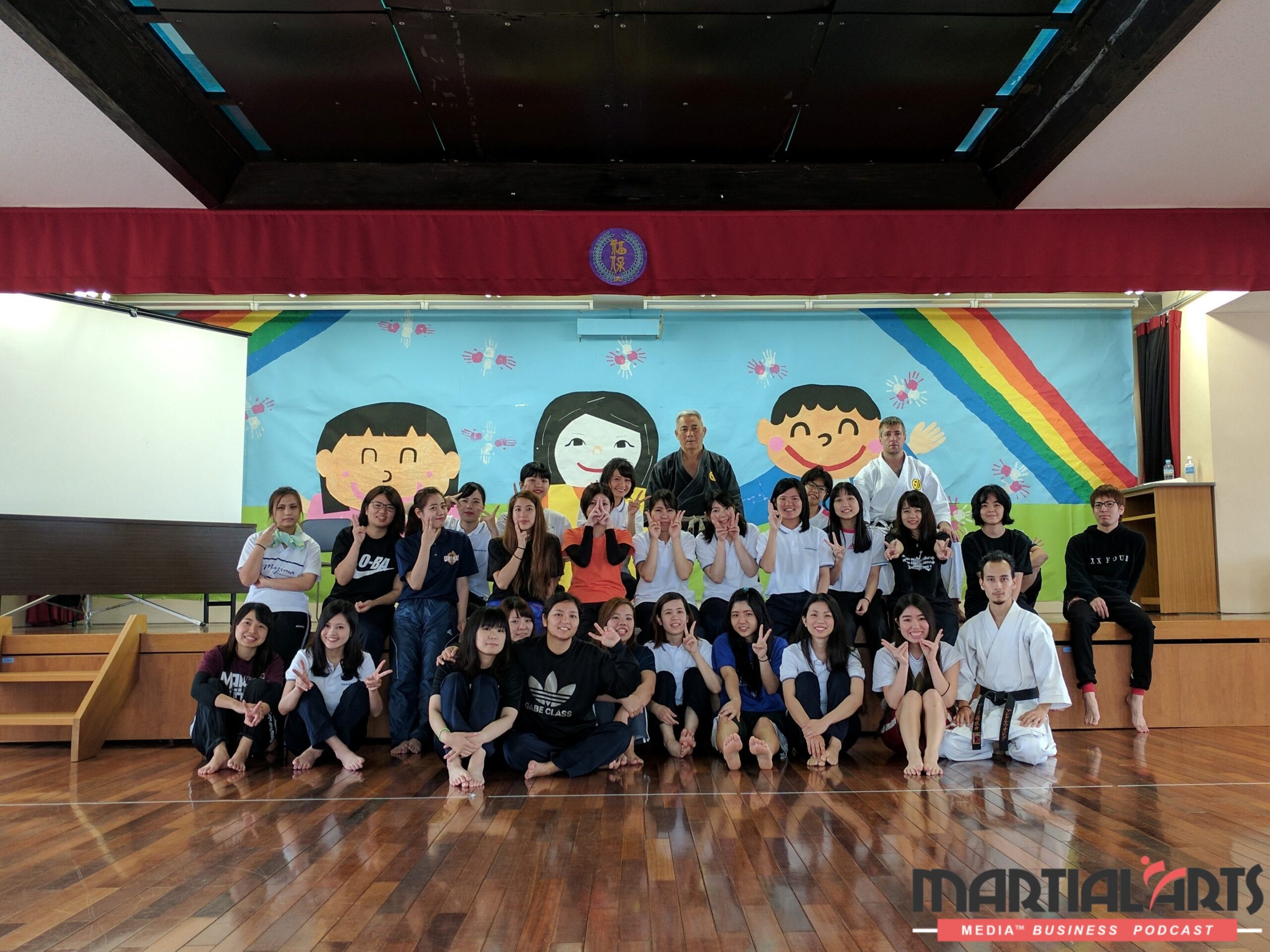
RICHARD: Well, I think when working with you and with Martial Arts Media™ and Partners, I think talking to everybody in the community kind of helped me to realize, “Hey, there's a lot of good martial artists out there that are charging what they're worth.” And like I said to you before, I have a hard time relating to people that have 400 students, 350 students.
I used to have 250 students, and I did it all by myself and I realized that I can't do it by myself. That failure, that I went backwards, actually taught me a lot, that if I can get there, once I get there again. I just have to get it in my mind and the tools to be able to do it, right? And I think by joining the group and the Partners has kind of helped me, kind of start that machine and get those wheels moving, that see that, “Hey, you know what, it's not bad to make money at doing what you're doing, right?” And it's not bad at – teaching your craft and getting something for it, right?
I put a lot of time and effort, and since Kim puts a lot of time and effort into making things happen, and the Facebook ads, all that stuff is something that you taught us, and like I said before, is that we're very thankful for that. And, you know, there's a point in time where money is tight. And I said, “Well, what did I do? Like I stepped into this thing, this commitment. And maybe it's the wrong thing to do at this time.” And the only thing I could cut is things that are new, and I'm grateful that I kept on going with Partners, because it's really teaching me a lot how to move forward, and how to move past that barrier of, you know, is it okay to make money?
GEORGE: Cool. I remember there was a, I mean, we've had many conversations after but I remember, in our, the game plan call that we have as onboarding when school owners join our Partners Group… I remember this, it had an impact on me as well, because I remember talking to you, and I remember seeing something go off in your mind, that you realized, “Oh, hang on, like, I can charge what I'm worth. I'm, you know, I'm more valuable than the way that we are going.” Can you recall that moment? I recall it, it really stuck with me.
RICHARD: That was when we had a private, kind of a private, call. And you sat down and showed me the map of what I could do, and I think that moment, I realized that, “Hey, you know, I'm actually a part of this game, too.” And like I said, I did it by myself before, I can't do it by myself.
I'm thankful for the person sitting beside me, because she does a lot, and she does a lot of stuff that I can't do, right? And not that I can't do it, I can probably learn it. It's just, it's difficult being, you know, I'm 58 years old, it's kind of hard to teach an old dog new tricks, as they say, right? That's not a Canadian term, either. That's actually a real term.
GEORGE: I've actually heard that one before.
RICHARD: But it's showed me, that showed me that I can make more, and since you showed me that, we are making more. Like, we got more people coming into the dojo, more than ever, with our Facebook ad. We're averaging about nine to… Well, I send it to you every week, right? Nine, and we just went up from nine, and went up from there; and, you know, we never had that traffic before.
Growing pains is a good thing. It's scary, but it's a good thing. And we just, we're floating our boat in a little bit rocky water that we don't know, but we're navigating through it, right? And we have you to help us along the way, to navigate through that. So yeah, that moment, I do remember that moment, that moment that you had showed us the way to do it. Yes.
GEORGE: That's cool. So, Kim, we want to hear a bit more from you there. No pressure. But I guess first, just as a quick side intro, right, what of the history and what of that attracted you to starting with Sensei Richard Fall?

KIM: I just moved to the city, and I was looking for a place that was… I was doing Goju-Ryu and I wanted to keep with that. It was actually a friend from way up north that told me about the London Karate Club. So, I did a class here. And I was kind of hooked, because I was doing it, I was training for about 15 years before, and it was a little different. I liked the lineage, how pure it was. It wasn't, like, branched off to different people. It was very direct. And I really liked that I could do the same style that I was doing for, like, 15 years, I can continue that, so… yeah, and then I just was hooked. I was like training every day here, and I continue to do that still to this day. So, yeah.
GEORGE: That's cool. Now, you also implement a lot of the marketing and so forth. So, how does your role work within the club?
KIM: Okay, yeah, so I started with being more social media, like, with getting stuff out there for our club and just putting it out there on Instagram and social media. And then I was just making positive progress with it, and it just turned into a manager role here. So, I've done sales for 15 years. So, I know a lot about that, and I have a lot of stuff that I can offer and I'm able to do for Richard. I also went to school last year, when I was let go of my job, and I did coding and website design. So, that's when I started getting into redoing the whole website, and it's going really, really well. And yes, so, I'm just continuing to keep going forward.
GEORGE: And keeping the marketing engine rotating…
KIM: Just going, which is a consistent thing that you do like every single day. So, yeah.
GEORGE: Love it. Ok, so, a quick couple of questions just on, I really wanted to bring the two of you on as my favorite Canadians, first and foremost. Getting a better understanding as well from just everything that you do, just the history and so forth. I want to take this opportunity as well, and just ask a couple of questions just about, you know, us working together, like what's helped you most. Although you have revealed a lot of that, just going into a couple of things, right? So, first up, like, when we started working together, you mentioned a bit about the money thing and the value in the belief, but what were the biggest problems that you were facing at that time?
RICHARD: The biggest problems that we were facing is that, in my mindset, I didn't want to be the lowest guy, I didn't want to be the highest guy, I wanted to be the middle guy. And being the middle guy, I gave away a lot of free two-week classes, which are two-week courses, which kind of shot me in the foot, because it's, uh, they're tire kickers, right? They don't really want to pay a big amount of money.
So, we would get maybe one, maybe one or two, one or two people from that, right? And it didn't really pan out, right? It didn't really pan out for us. So, I was kind of trying to feel my way through it, and then it really, the success I had, like I said, I've been doing this for 32 years on a part time basis. There were five Meibukan schools in London, and I'm the only one left. So, I'm very, I'm a very dug-in person. I'm a very perseverant person, right?
So, I think, by the mindset of giving stuff away, I always gave it away, instead of selling it, right? So, moving on to meeting you, Kim and I used to listen to podcasts all the time. They kind of got me hooked. I said, “Well, let's…” I let her listen to you, and we listened to you. I even used to listen to you all the way when I went to work or home. I found it very interesting. I'm going, like, you know, I wonder if this guy is really true blue, real guy, right?
So, I think Sensei Kim, I think Kim reached out to you. I'm going, “Holy crap, he actually listened and he actually, you know, got back to us, right?” So, that's kind of what got that ball rolling, was actually Kim calling you or sending a message to you, and yeah, then it went from there, right?
GEORGE: And what was the big goal? I mean, at that time, what was the big aim? The big goal that you wanted to achieve?
RICHARD: I wanted 300 students, that was all.
GEORGE: 300 students, why did you want 300 students?
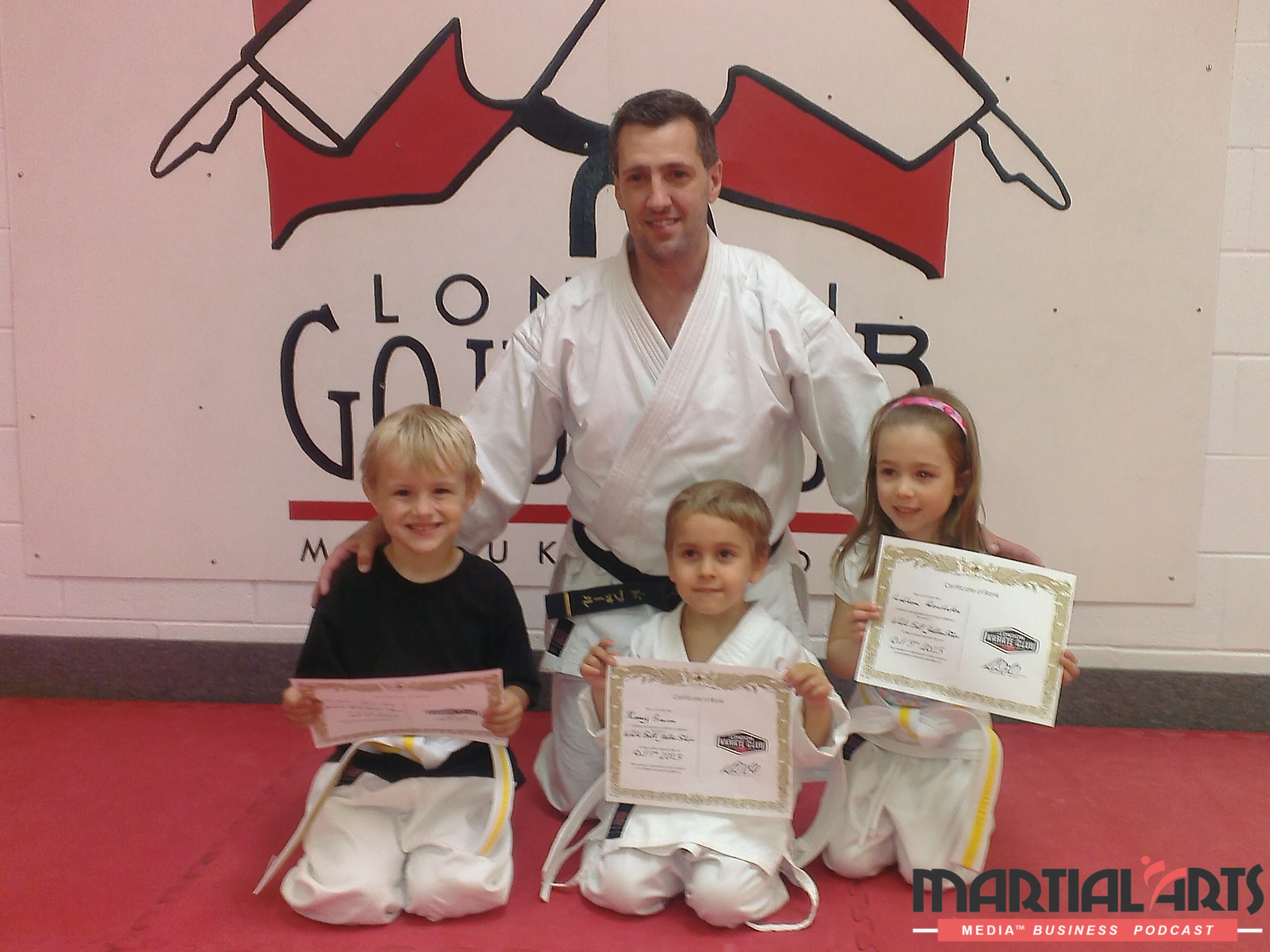
RICHARD: Because I think moving forward, I want to have a living doing this. I want to get away from my day job and do this as a living. Like, I want to have what Lindsay Guy has, I want to have what Cheyne McMahon has, I want to have what Ross has, right? I want to have that and not because of… No, good for them, I just want to have that for me. As at the end of, when it's all said and done, I can say, “I built that.” I made that happen, right? And it was always – I came close but never really made an achievement.
So, I guess it's seeing my baby, which is the dojo here, the school, to become what I want it to be. You know, this gem that I want it to be and I want those students just, not to blow my horn, I teach a really good martial art and I want those students to move forward and them to become teachers. I want them to become senseis of their own dojo, right? And that is why I want to get to the point of becoming bigger, right?
GEORGE: So, out of that, while working together, I mean, what's had the biggest impact? And what's helped you the most?
RICHARD: Of growing now? I think the social media part. I think Facebook – Kim can answer that as well.
KIM: Yeah, for sure. Definitely the Facebook ads, and learning about them, and how to advertise and catch people's eyes for the ads. That's been a huge impact for us, like, I received messages, like, 30 messages a day. So, that's had a huge impact on us for sure. 100%. Like, we've had to actually make classes built around beginner classes. So, that really pushed us forward too and it started us thinking about how we can gradually bring them into our family of London Karate Club. So…
RICHARD: So, when you had that challenge, that 72 Hour Sale, I remember saying to Kim, “There's no way we win this, there's no way.” We've got Brad who has 400 students, you got Cheyne who has 350 students… This little dojo of 100 students, there's no way we're going to be able to beat these guys, right?
So, we did give it our best. We gave it our best and hoped for the best. And I just had one more day, I had one more encore day in my pocket, and we sold four memberships on that one encore day, right? That moment showed me that I can move a mountain, right? I can make it happen, right? And it's refreshing that something can make you and bring you up and lift you up like that, right?
And, you know, why did this little dojo, this little school, beat these guys with all these students? Right, perseverance, right? It's perseverance. It's like the Rocky movie, right? You know, the guy who doesn't think he's going to win, and all of a sudden, he's there, right? You know, now I know moving forward. And like I said, the other night, I'm looking forward to moving forward with you, and I'm excited for what's coming, right?
GEORGE: So, just a bit more on the 72 Hour Sale, I think just for context for anyone listening. I know a lot of people run like a Black Friday sale or Christmas sale. We've got this method in the Partners group called the 72 Hour Sale, because it was created before we created anything for Black Friday sale, but it can be used as a Black Friday sale or Christmas sale or any valid reason that you really give it.
So, you can run it four times a year, twice a year, you know, whatever. Whatever mountains you're trying to move. In our Partners Group, we put together these challenges every so often. So, we run on six week cycles, and we put together a challenge, and we just see who gets the most numbers. Who would have thought martial artists are competitive?
Everybody tends to rally up and get stuck in, right? And, so, we ran the six-week challenge. You could tell us more, right? But like Richard, as you were saying, you thought it was not possible, because you've never done something like this, and then you ended up with the number?
RICHARD: Right. I never thought you could do that in 72 hours. I never thought in my life. I've never done – that was the best sale – and that was the best month I've ever done. Like, ever, ever! And it was, like, it opened my eyes. If you really put your mind to it and really put everything aside and just focus on that number – focus on that number – 20, 20, 20.
And that's what I was focused on, I was focused on 20, but in the back of my mind, I would have settled for 15, right? But that last day I said to Sensei Kim, “We're not settling for 15. We're not settling for 16. We're going to get 20.” And we got 20! And well, the way we did it was that we took – it's not just selling individual memberships, we started involving families, right?
So, we had one lady who signed up for a family of three, right? So, we took the first number as the number, and then the other ones would kind of it's a little bit smaller, right? So, we actually sold family memberships and went there. So, we made that number just by being a little bit creative, right?
GEORGE: And that number, the dollar number, was 31?
RICHARD: Just almost 31,000. Was 30,880 odd dollars. Yeah.
GEORGE: That's nice. Bonus, right?
RICHARD: It was…
GEORGE: Especially if you haven't done that! Now, I think what's more important from that, and you were sort of mentioning that as well, is how does that make you feel as in what you can achieve next? Like, I mean, it's nice to grab the cash and money's great, but what impact does it have on you?
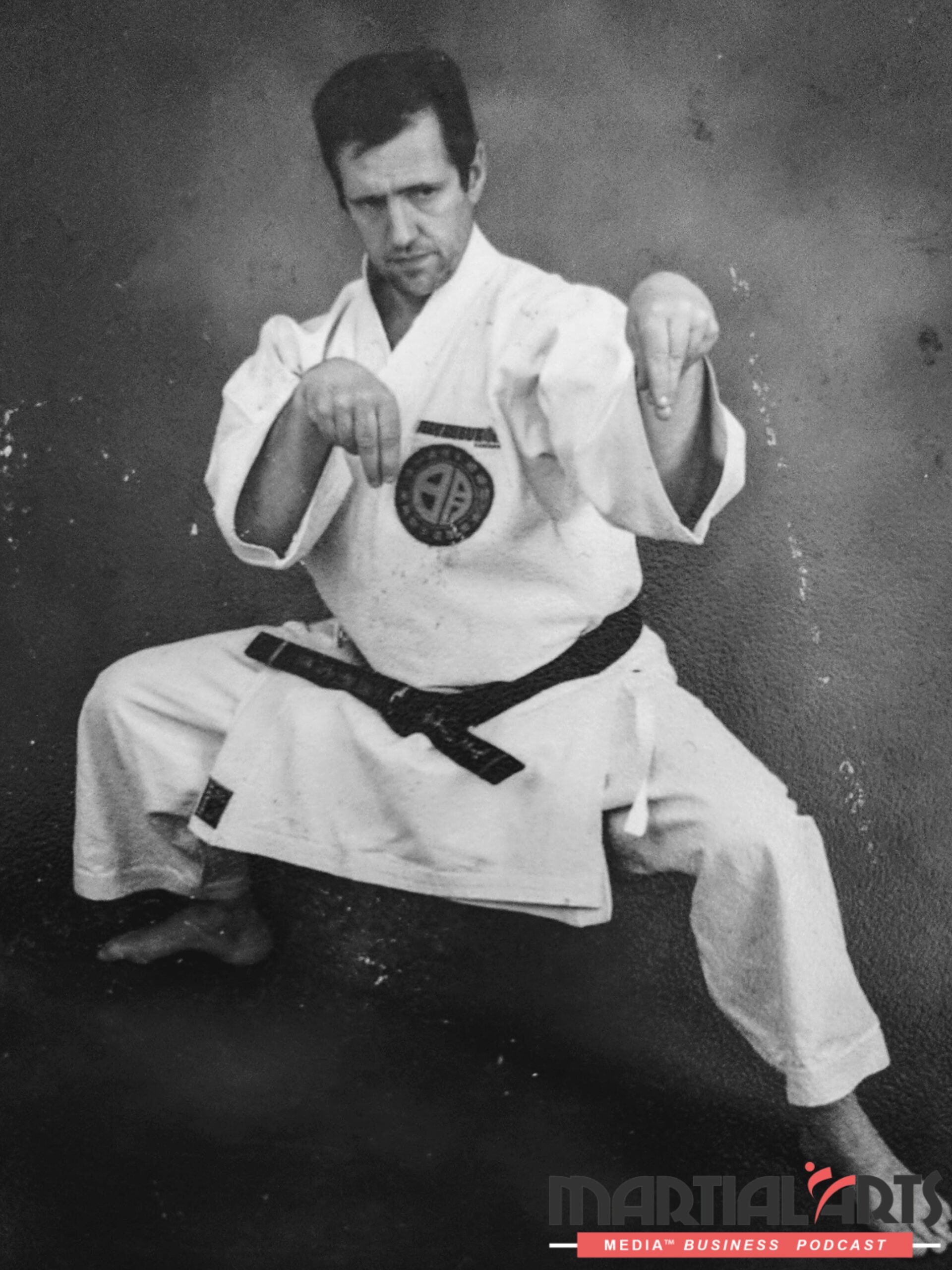
RICHARD: It shows me that I – everyday sales – if I really ramp it up and really focus on what I need to focus on, and it shows me that I can make this as a living. It shows me that if I really had to spend all my time and effort at this, that I will never have to go through that door for someone else again… because really, when we go to work, and we're not working for ourselves, working for somebody else, that door becomes a dreadful, dreadful entrance, right? The shrine that's behind me, you see the gate of training there.
I have the gi of training at the door of my dojo, and every time I pass over that, the world stays behind. This is my world, right? So, I want that door. I want to walk through that door every day. I want that door to feed me every day. Feed me that positivity every day. And then, Kim and I, we work on positivity stuff all the time, right? We try to keep ourselves positive. I said, you know, through this 72 Hour Sale, we can't be negative, we got to be positive and we got to think positive, right?
And it just shows me that I can make a living at this, right? I can make a living at this, right? And I gotta shake off those fears, right? Like fight full contact in Japan and shoot fighting – getting punched in the face sucks. It really sucks getting punched in the face sucks, right? I did a 20 man fight in Okinawa for my 8th Dan. It sucks, bare fist, fair enough, it sucks. But that stuff's easy compared to… To me, that stuff's easy compared to shaking off the fear of going into business for yourself. But it showed me, the 72 Hour Sale showed me that I can do that – I can shake off those fears.
GEORGE: Yeah, and hats off to you because it's not, I mean, we provide the strategy and the formula… and it's great that we've got so many smart cats in our group that we can test different strategies, and we even refined things that last few days, and how can we change the offer to make it more valuable.
But it should be said that none of this happens if you don't have a great product – and that means you deliver great classes, teach epic classes and deliver great martial arts classes. So, nothing happens without that. Last few questions, if you had to answer this: I almost didn't join, because…?
RICHARD: I almost didn't join, because I didn't know if I could make the commitment to afford it. To be honest with you, George, what I did was – hoping my wife doesn't listen to this – during the first part of COVID, I, well, leveraged my house to keep this place open, because nobody was here – was just me, right?
And the first part, I didn't know how to do Zoom, we didn't know how to do Zoom, right? We didn't understand it, and then – we joined – it was the Partners that helped us with Zoom, right? We joined Zoom, we joined Partners, and we had to figure Zoom out. And so, what we did is we bought a year subscription for Zoom, and now we're teaching Zoom classes when we're locked out.
And people are coming out – people don't like it so much – but the people are coming out, right? Because it's information. It's information. And I, like, I picked up a student through Sensei Kim in the UK, and he's training now and he's enjoying it, right? So, I mean, Zoom has its place, and you know, it taught us that we can touch and get involved with a lot of different people around the world.
GEORGE: Love it.
RICHARD: I was afraid I wouldn't be able to commit to you. That's my biggest fear. That was my biggest fear.
GEORGE: Now can I ask, Kim, what did he really tell you?
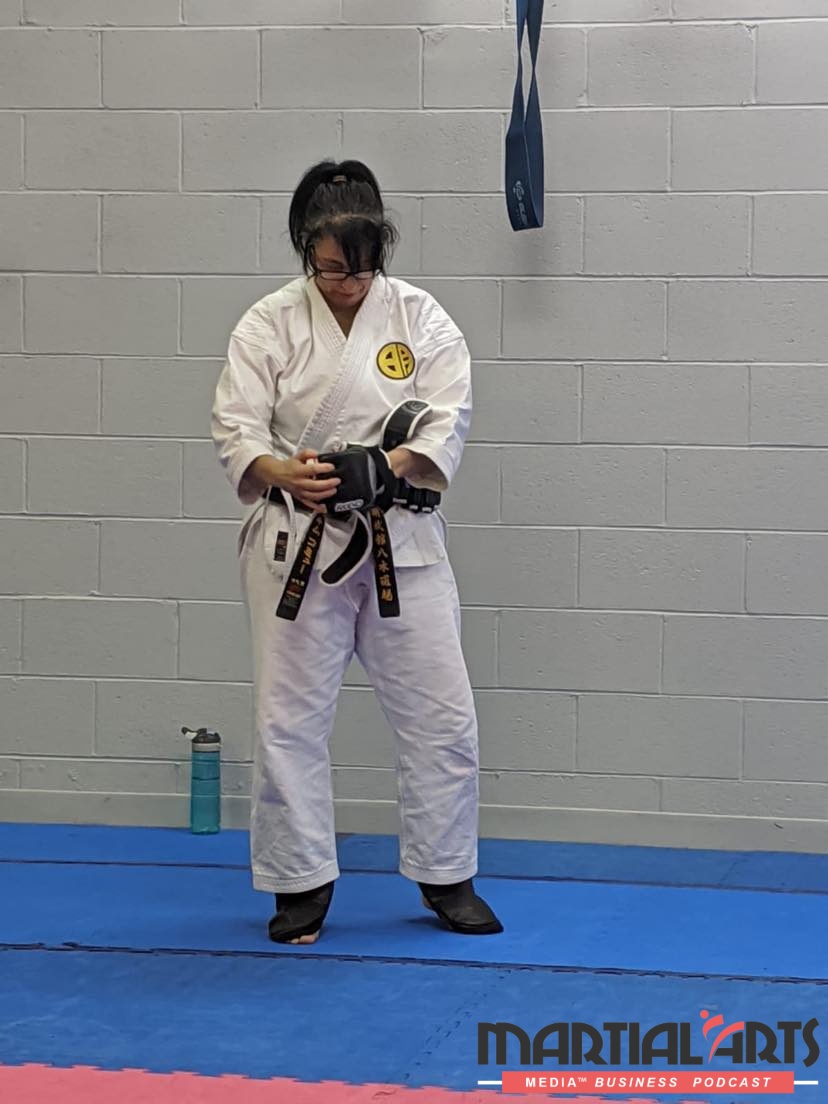
KIM: It was, that's what it was. It was, you know, can we keep putting money into this and you know, keep going and going forward at the same time? That's what it really was. And we just decided like, “Hey, let's just do it.” And like I said, the 72 Hour Sale, I think really opened us up to what we could do. It did for me too, because it – we were just a small dojo in, you know, in Canada, London, Canada, and we blew it out of the water really. For the short time and the work that you put into it, we got a lot out of it, and it just tells me that we can do a lot more.
RICHARD: Well, the other thing is though, when you sat down and went through the four-week sale with us, the four-week program? We used that four-week program, it brought a lot of students into us. So, that was the moment that you were talking about, when you saw the, “Hey, I can do this.” When I, when my wheel started changing, was that day and that's why I stayed. And also, just the feedback I get from all the people just sitting by – I don't talk a lot in the meetings – but I'm absorbing.
I'm absorbing what they're saying and, you know, we're very much a paper and pen dojo. We haven't gotten on to a lot of apps and sign-in apps and stuff, and we're trying to figure it out now. Like, we're trying to figure it's got to be easier, right? So, we're getting a lot from the group and the Partners group and we're very thankful to be a part of it. Like it's, it's really helped us a lot, George. You guys have really helped us a lot. And I kind of like you a little.
GEORGE: Ah, cool. So…
RICHARD: Just a little bit, just a little bit. Take it easy.
GEORGE: Okay, just a little, right. Good. I was glad to say that the, you know, the South African Aussie accent wasn't, you know, anything weird.
RICHARD: Your Canadian accent is better than your Aussie accent.
GEORGE: I do my best, hey! But one last thing, who'd you recommend us to, and why?
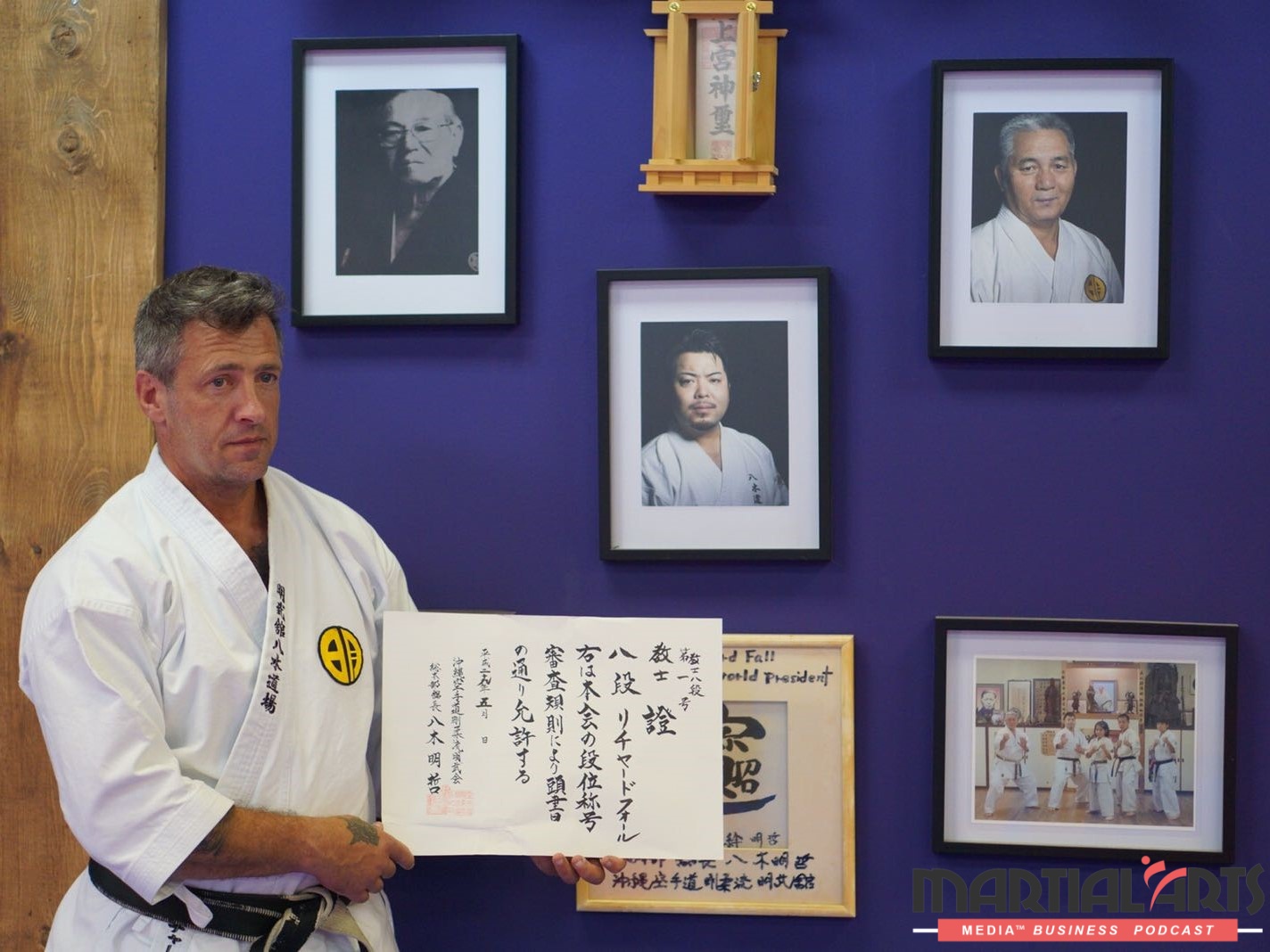
RICHARD: I would recommend you to anyone, anyone who's looking to make gains in their schools, and to just all around, make their schools a better place, financially wise, and even with the stuff that you guys help us with, with getting classes scheduled and figuring out timewise… I would recommend it to any martial artists out there that really, really are struggling and martial arts schools all struggle, we all struggle.
And if you want to be able to move forward in your craft that you love so much, I would recommend it to anyone, any school. Any school out there can always use the martial arts Partners, Martial Arts Media, and… nothing but good things, nothing but good things will come from it.
GEORGE: Thanks so much, Richard and Kim. Thank you. And if that's you, and you're listening to this, and you do need some help. Best way to do that probably if you go to martialartsmedia.com/scale. We've got a little questionnaire you can just add your details there, and we'll reach out and have a chat and see if it's the right fit for you. No Canadian Club whiskey or anything was sent over as a funded endorsement. Do you guys even drink Canadian Club or is that just a thing?
RICHARD: No, no, that's, that's so… no, no.
GEORGE: Right, because I discovered Fosters beer when I lived in the United States, which is this big one liter can of beer. I was like, “Oh, wow, this is really cool.” And then when I ended up living in Australia was like, “Where the hell is Fosters?” Like you cannot buy Fosters. It's not a local Australian beer and nobody drinks fosters here. So, it's just an American thing or a North American Canadian thing. I don't know if you guys get it in Canada, but I think the attraction was it was just this big one liter can of beer. Yeah, right. So, Canadian Club is not a? No?
RICHARD: No. It's not really good whiskey.
GEORGE: Cool. Hey, Richard, Kim, thanks so much for being on. I'll speak to you soon. See you on the next call.
RICHARD: Great. Thank you for having us, George. We really appreciate it.
KIM: Thank you.
RICHARD: Appreciate everything you've done.
GEORGE: Thank you.
RICHARD: Thank you.
Here are 3 ways we can help scale your school right now.
1. Download the Martial Arts Media™ Mobile App.
It's our new private community app exclusive for martial arts school owners, with top courses, online events, and free resources to help grow your business. Click here to download for iPhone or Android (any other device).
2. Join the Martial Arts Media™ Academy Membership and become a Case Study.
I'm working closely with a group of martial arts school owners this month to get to 100+ students. If you'd like to work with me to help you grow your martial arts school, get started with our 7-day risk-free trial – Click Here
3. Work With Me and My Team Privately.
If you would like to work with me and my team to scale your school to the next level, fill out the form and apply HERE … tell me a little about your business and what you would like to work on together and I'll get you all the details – Click Here
Enjoyed the show? Get more martial arts business tips when you subscribe on iTunes for iPhone or Stitcher Radio for Android devices.
***NEW*** Now available on Spotify!



